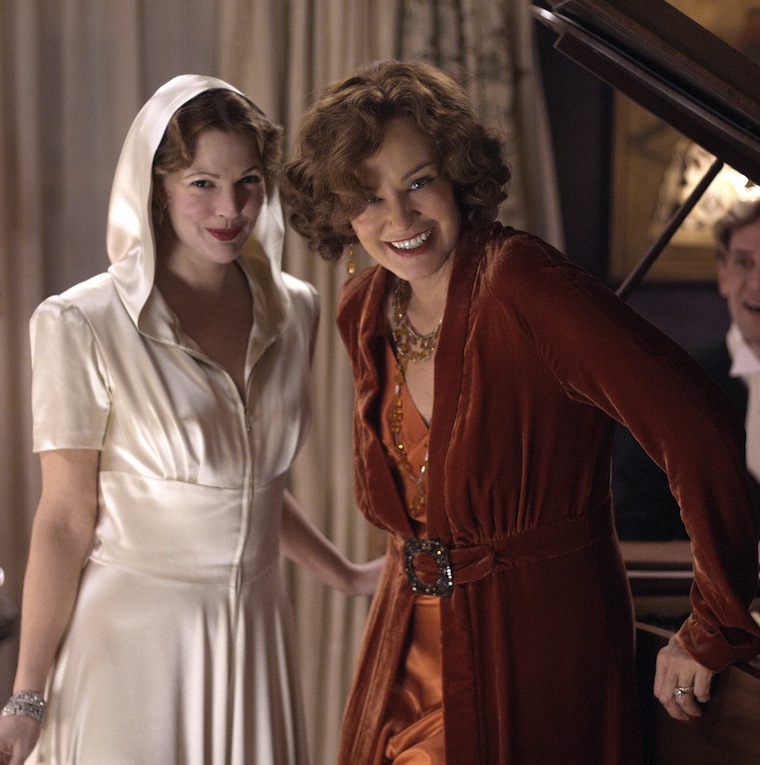On this day of celebrating mothers, it seems a good time to revisit this review I wrote on the HBO version of ‘Grey Gardens‘ that Andy and I saw on the big-screen when it premiered back in 2009. (In an outcome that never happens when I play the lottery or enter the HGTV Dream Home contest, I actually won tickets to the ‘Grey Gardens‘ screening in Boston.) That was a magical night, and the movie celebrates two magical women – a mother and a daughter – whose love forms the emotional core of a sometimes-disturbing deterioration, and ultimate celebration, of humanity. To all the Big Edies out there, this one is for you:
Before saying anything else, let me preface this write-up with an admission: I was not prepared to like the new version of ‘Grey Gardens’. The original documentary has the untouchable quality of a classic to it, and who else but Edith Beale could play Edith Beale? In this case, the two women chosen to portray big and Little Edie, Jessica Lange and Drew Barrymore, have never been particularly impressive to me as actresses, and the thought of their taking a hatchet to my beloved ‘Grey Gardens’ was enough to make me, in the words of Little Edie, “apoplectic”. Perhaps because I was expecting so little enabled me to enjoy it so much – and this new take on the Beale women is “an artistic smash”.
The original ‘Grey Gardens’ premiered in 1975, the year I was born. I didn’t come to know the documentary myself until 1999, when I found a list of the “Campiest Divas” in the movies. The usual suspects were all there ~ Better Davis as Baby Jane Hudson in Whatever Happened to Baby Jane?, Gloria Swanson as Norma Desmond in Sunset Boulevard, Faye Dunaway as Joan Crawford in Mommie Dearest – but all these luminaries were listed below the number one choice – Little Edie as herself in ‘Grey Gardens’. Who was this obscure lady who topped the others I knew so well? A small grainy photo of a woman in a turban accompanied her number one status, and I set about on my search for the movie.
I looked like mad for the title, but at the time it was not available. I sent Suzie on a quest in New York City to see if she could track it down, all to no avail. It wasn’t until a year or so later that Criterion released it, and since then it has become a favorite – so the idea of tampering with such distinctive material was a risky move for all die-hard fans. Thankfully, Big and Little Edie have proven themselves worthy of re-interpretation, most notably in a Broadway musical and now the HBO film version. At first I was dismayed by the casting choices of Barrymore and Lange, but I now have to admit that I was wrong.
Both actresses acquit themselves admirably of their roles. As Big Edie, Lange manages to be both sympathetic as a prisoner of her own social construction, and manipulative as the prison guard of her daughter. Barrymore is beguiling and brazen, tough but tender, haplessly innocent one moment, wisely wary the next. Her Little Edie is able to win people over despite her unconventional behavior and demeanor, and in flashbacks we get to glimpse the beauty she once was, which adds an unexpectedly emotional layer that the documentary could never quite conjure.
Every time I see it I am touched by something new. This version is somehow sadder, more poignant in the way it fleshes out what possibly happened between the two Beale women. Of course, no one will ever know exactly how it all came to be except for the Beales themselves, and neither one is around anymore. (Big Edie died just a year after the original documentary was completed, and Little Edie passed away in 2002.)
This time I was struck by how the world treats – and ultimately ignores and neglects – those who are different. I saw the story of two women trapped in the societal norm of having to get married and give up their dreams – whether that’s singing or acting or dancing or simply existing without the help of a man. I also saw how two people in the same situation – mother and daughter no less – can sabotage, manipulate and destroy in the name of love and loneliness and desperation – but I also understood how love could be enough to sustain them and fortify them against the world. Theirs is a brilliantly complex relationship, based on equal parts of love and resentment, fulfillment and regret.
There is something so sad and chilling when big Edie delivers the crushing final blow to her daughter, after years of living together, telling her that she’s an “acquired taste” and that no one in the world would ever understand her. That’s the price of being different and believing in yourself, and Little Edie, to her credit, did both up to the very end.
It remains to be seen whether audiences will get this version – anyone who hasn’t seen and loved the original may have a tough time getting past the idiosyncrasies and extreme living conditions of the main characters, but for me this was an exquisite homage to two women more vibrant and alive and interesting than anything anyone could ever make up. That out of the ruin of a run-down and forgotten mansion, memories of songs and summers past have survived to this day is a testament to the enduring character of Big and Little Edie. Somewhere they are singing and dancing and celebrating that their dreams have at long last been realized.
Back to Blog
